
American fatherhood looks different than it did decades ago. Today’s dads spend more time caring for their children, and they’re less likely than in the past to be the family breadwinner. At the same time, most view parenthood as a key aspect of who they are, and many have clear aspirations for their children’s futures.
For Father’s Day, here are six facts about the views and experiences shaping fatherhood in the United States today.
Pew Research Center conducted this analysis ahead of Father’s Day 2023 to provide a snapshot of the experiences of fathers in the United States. The analysis is based on government data from the Bureau of Labor Statistics’ American Time Use Survey, as well as survey data and analyses of outside data by the Center. Links to the methodology and questions of Center surveys and analyses can be found in the text of the analysis.
Dads overwhelmingly view being a parent as an important aspect of their personal identity, a survey of U.S. parents conducted in fall 2022 shows. The vast majority of fathers with children under 18 (85%) say being a parent is the most (24%) or one of the most (61%) important aspects of who they are as a person.
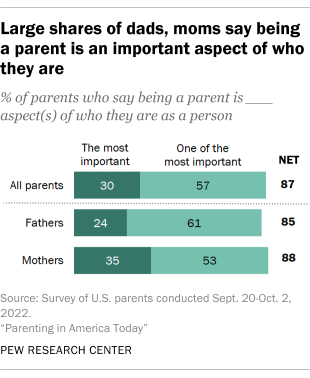
Large shares of dads also say they find being a parent enjoyable (81%) and rewarding (79%) all or most of the time.
Most of dads’ time with their kids is spent playing or providing care, according to data from the 2021 American Time Use Survey. Dads with kids under 18 in their household spend, on average, 1.02 hours caring for and helping them per day. This includes 0.36 hours playing with them and 0.32 hours providing physical care (such as dressing and bathing them, changing diapers and getting them ready for school). Fathers report spending less time each day reading to and with their children (0.05 hours on average) and on activities related to their kids’ education, such as helping with homework or school projects (0.05 hours on average).
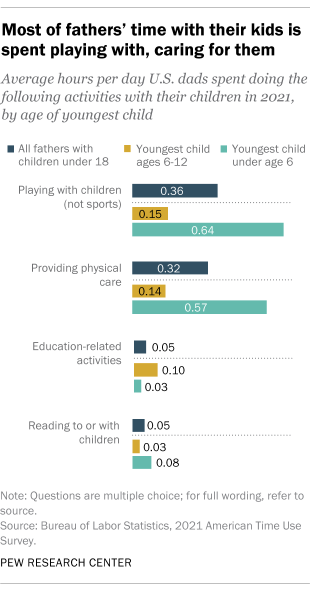
Fathers with children younger than 6 years old tend to spend more time with them. These dads spend 1.62 hours with their kids on average per day, including 0.57 hours providing physical care; 0.64 hours playing with them; and 0.08 hours reading to and with them.
Still, moms tend to spend more time than dads do on caregiving and education-related activities for their kids, regardless of the children’s ages.
The more children a couple has, the more likely the husband is to be the family breadwinner, according to a recent Center analysis of Current Population Survey data. For instance, husbands are the primary or sole breadwinner in 48% of opposite-sex U.S. marriages with no children, 54% of marriages with one child, and 57% of marriages with two children. And in 69% of marriages with four or more kids, the father is the primary or sole earner.
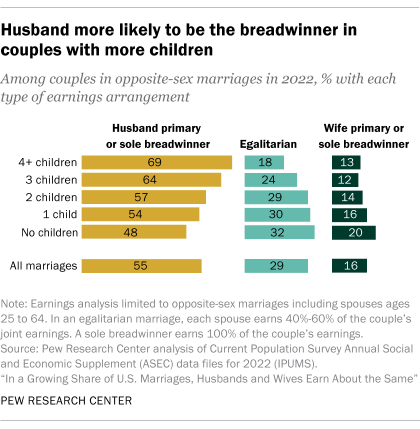
However, the share of all opposite-sex U.S. marriages with a breadwinner husband has fallen steadily, from 85% in 1972 to 55% in 2022. That year, both spouses earned roughly the same amount of money in 29% of marriages, and in 16%, the wife was the sole or primary breadwinner.
Most Americans say it’s best for children when their mom and dad both focus equally on work and taking care of their kids and home, a January survey by the Center found. About three-quarters of adults (77%) say that children who are raised in a household with a mother and a father are better off when both parents focus equally on their job or career and on taking care of their children and home. About one-in-five Americans (19%) say children are better off when the father focuses more on his job and the mother focuses more on the home and child care. Only 2% of Americans say children are better off when the mother concentrates more on her job while the father focuses on the home.
Still, 57% of adults say that American society values the contributions men make at work more than their contributions at home, according to the same survey. About a third (35%) say men’s contributions at work and at home are valued about equally, and just 7% say that their contributions at home are valued more.
Fathers are more likely than mothers to feel judged by their spouse or partner for how they parent their children, according to the Center’s fall 2022 survey of parents. Among fathers who are married or living with a partner and have children under 18 years old, 56% say they feel this way at least sometimes, compared with 49% of mothers.
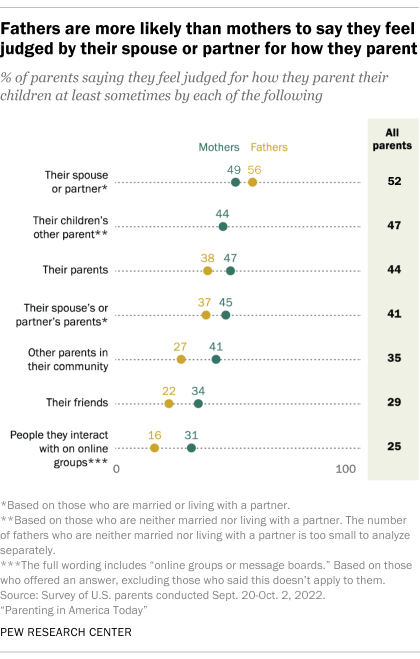
Smaller shares of dads report feeling judged for their parenting at least sometimes by their own parents (38%), their spouse’s or partner’s parents (37%), other parents in their community (27%), their friends (22%) or people they interact with in online groups or message boards (16%). By wide margins, larger shares of mothers than fathers report feeling judged by each of these groups.
Dads place a high priority on their children becoming honest, ethical and hardworking adults, the fall 2022 survey shows. Majorities of dads say it’s extremely or very important to them that their children be honest and ethical (93%), hardworking (87%) and ambitious (64%) as adults. Large shares also say it’s highly important that their children become adults who help others in need (78%) and are accepting of people who are different from them (75%).
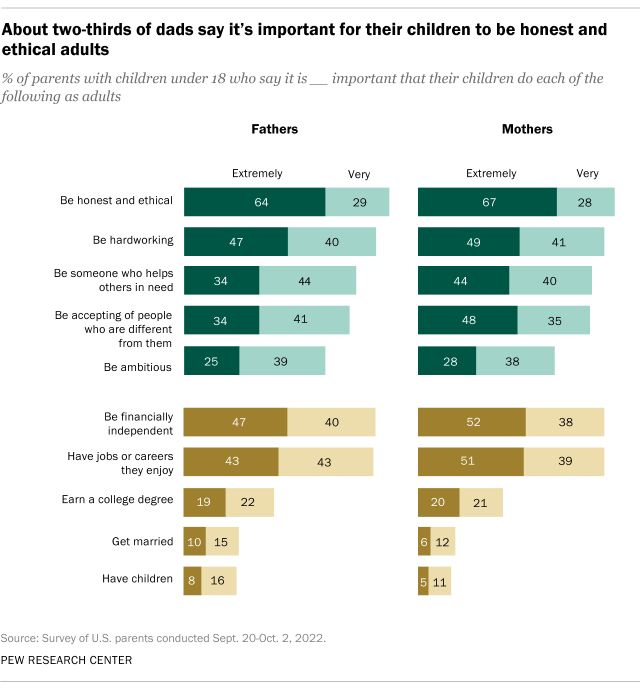
When it comes to other aspirations for their children’s future, the vast majority of dads say that it’s extremely or very important to them that their children become financially independent as adults (87%) and have jobs or careers that they enjoy (86%). Fewer say it’s extremely or very important to them that their children earn a college degree (41%), get married (25%) or have children (24%).



